- Home
- Marjorie Farrell
Christmas Rose
Christmas Rose Read online
CHRISTMAS ROSE
Marjorie Farrell
Chapter 1
On this cold December night, not quite a fortnight to Christmas, Jonathan Holford, Earl of Meare, would have been quite willing to admit he was drunk. Not disguised, mind you. Not falling-down, unable to get up drunk, which was lucky on such an icy evening, but what he called “fizzy,” a condition once removed from bosky. Unfortunately, it was a state with which he had become familiar over the last six months.
Getting fizzy meant that for a few hours each night he felt buoyed up. If not full of joie de vivre, he was at least not blue-deviled. Of course, the golden bubbliness was gone by morning and he was left feeling as flat as left-over champagne, again fully aware of the failure of his marriage and by evening, driven again to seek escape with brandy or claret or whatever was being served by his host.
A hitherto naturally abstemious man, he sometimes wondered whether this mild beginning would lead to a progression in drunkenness, and to years of being tossed in cabs and sent home by his friends. He hoped not. But despite his worrying in the mornings when his mouth felt like cotton batting, he was incapable of turning down the one thing in his life that gave him a few moments of happiness.
On this particular evening a light snow was beginning to fall. The streets and sidewalks were slick, and Jonathan came close to falling down several times. “But I am not drunk, mind you,” he announced to the lamppost which had saved him. “Just fizzy.” He bowed and continued on his way, slipping and sliding as he turned the corner into Grosvenor Square.
Almost all the houses along South Audley Street were dark, for most of Lord Meare’s neighbors were long gone into the country. As he passed by one house and then another, he pictured Lord and Lady Boxborough decorating the halls of their Sussex home with their grandchildren, and Sir Hubert Barrand and his lady seated before a cozy fire in Kent, Lady Barrand with her feet up, rounded belly covered by a cashmere shawl. Even Major Downing, a self-declared bachelor, was gone to Bath to be with his sister and her family. He had left two days ago, his carriage piled high with presents for his nieces and nephews.
And there, down at the end of the street, was the residence of Jonathan and Madeline Holford, Lord and Lady Meare, who had remained in London for the past two Christmases. Who had started their married life with every reason to believe they would only become happier with each other. Who now could hardly bear to be in the same room together. Who were childless.
Theirs had been that rare thing, an arranged marriage that was also a love match. Their families’ estates in Somersetshire marched together, and they had been expected to wed for years. Jonathan was older than Madeline by a few years, and she had worshipped him, tagging along every chance she got.
Lucidly for both of them, Jonathan’s absences at school and then his short stint in the Peninsular campaign enabled both of them to question what they had for years taken for granted. Jonathan’s fancy was captured by more than one dark-eyed Spanish beauty, and during Madeline’s first Season she was an overwhelming success and had her heart interestingly bruised by a tall, handsome, totally ineligible viscount.
They were also lucky that both sets of parents were eager but not desperate for their match. Neither Jonathan nor Madeline felt badgered, and indeed, Madeline knew that had the aforesaid viscount been eligible or interested in marriage, her parents would have approved the match. Reluctantly, perhaps, but they wanted her happiness above all things.
But when Jonathan walked into Lady Sedgewick’s ball, the first ball of Madeline’s second Season, dressed in full regimentals, his golden hair bleached almost white by the sun of Portugal, Madeline took one look at him and thanked God that Viscount Richmond’s father had gambled away the family estates. There he was, the friend of her childhood, looking so familiar and yet so strange, and utterly desirable.
And Jonathan, who had not seen Madeline for two years, was just about to have himself introduced to the stunning brunette when he realized that the statuesque beauty was no other than his long-legged, formerly skinny neighbor. All his plans to speak to his parents about his desire to seek his own bride went completely out of his head.
It took only two weeks for them to announce their betrothal. Society agreed that it could hardly be called a whirlwind courtship, since their engagement had been expected for years. But it was very romantic, wasn’t it, when two such well-matched young people were also clearly head over heels for each other?
They were the golden couple of the Season, and for three Seasons after that. While neither sat in each other’s pocket, it was obvious from the expression on their faces when one or the other walked into a room, that their love had not faded at all. They had everything: love, health, beauty, and happiness. They had everything but children.
At first it had not mattered. After all, not every couple produced children immediately. And so, for the first few years, Jonathan and Madeline stood the teasing and then the sensitive questions from their friends and family good-naturedly. And if there was a direct relation between physical pleasure and conception, as Jonathan remarked one morning after a particularly passionate night, we would be the parents of a baker’s dozen.
After two years of marriage Madeline visited the family doctor in Somerset. After three years, a specialist in London. And during the fourth year of their marriage, she tormented Jonathan and herself by either swallowing or applying any and every folk remedy recommended by women from the Duchess of Devonshire to any old woman she encountered in London or the country.
At the time Jonathan had not thought he could stand it. But at least they had still been talking and making love. At the oddest times, perhaps, and in the most ridiculous positions and hardly spontaneously, it was true, but they had still shared a bed. And now he looked back on what he had thought of as a year of torture with something resembling nostalgia.
After that he had felt utterly helpless. Madeline clearly felt a failure as a woman. He had tried to reassure her again and again. And he tried to laugh her out of her sadness by pointing out that at least she would never lose her figure or her sleep, that his cousin would make a perfectly competent earl when the time came, and wasn’t his love enough for her?
Nothing worked and Jonathan began to doubt his own abilities as a husband. Surely she couldn’t love him as much as she claimed if he wasn’t enough for her. And from time to time he wondered if it were possibly some lack in him. . . . But of course not. Everyone knew that childlessness was the fault of the woman.
By the fifth year of their marriage they hardly ever made love. At first Madeline had just cried through Jonathan’s lovemaking, not wanting to give up trying, but utterly hopeless about the outcome. Then she just lay there silently. It began to seem to Jonathan that he was raping his own wife, although she was willing enough, and so he stopped initiating contact. As soon as he did, the physical side of their marriage was over.
They kept up appearances as well as they could, but it soon became clear to the ton that the Holfords had gone the way of many another couple, into polite indifference. Jonathan was punctilious in his attentions to his wife, but spent all the time he could with his friends and the occasional willing widow. His flirtations were never more than that, though no one would have believed him, including Madeline.
Madeline, who had had only the normal interest in gossip, fashions, and flirting, became obsessed with them. Her natural companions, under any other circumstances, would have been friends of her own age. But all her friends had become mothers, and the main topic of their conversation was their children.
And so she frequented the company of the faster ladies of the ton, those who had no interest in family or children and left them to their nannies and nurses. A few years ago Madeline had w
atched these women from afar, wondering how anyone lucky enough to have children could desert them. Now, she was so dead to her old self that she was happy to have found a group of friends whose concerns were utterly frivolous.
Neither husband nor wife questioned the other. They went together to most occasions, but returned separately, often in the early hours of the morning. For the past two years they had not shared a bed, had not had a real conversation, and were each privately convinced that the other had taken at least one lover.
They spent every Season in town. During the summer, of course, they were at Meare, but for the past two years, they had remained in London for the holidays. Neither had offered reasons beyond “Not wanting to miss the Cross soiree, you know,” or “The traveling being so tedious at this time of year.” Both knew that it would have been unbearable at Meare, with Madeline’s brothers and sisters there with their children. They always received invitations from friends, but consistently refused, knowing that a Christmas with a happy family would be impossible. And so, during the holidays they increased their socializing, Madeline flirting madly and ever on the verge of finally giving way to one of her devoted followers, and Jonathan getting slightly drunk, as he was this night.
Afterward he wondered if he had had one glass more whether he would have missed it altogether. At first as he made his way down his street, walking slowly to keep his balance, the snow falling more thickly, he had his eyes only on the pavement in front of him. His buoyant mood was fading, and a fall would have no longer amused him.
When he saw the woman, he only thought how odd it was for a laundress to be leaving her basket on the front steps. He had passed the house in question before it struck him as more than odd that on a cold and snowy night— or make that early morning—a woman would be delivering laundry. To the Barrand home, moreover. The Barrands had been in Kent for ten days.
The woman was almost out the front gate by the time he turned around. When he got closer, he could see she was no laundress. She was wearing a dark red velvet cloak trimmed in what looked like ermine. No working woman would be dressed like that. But neither would a lady. The cloak was for too flamboyant for a lady. But then what was a woman from the demimonde, for so she must be, doing here on South Audley Street, delivering laundry?
Jonathan put his hand on the gate, holding it closed so she could not get out. She looked up in surprise and alarm, and he could make out her face under the street lamp. She was a good-looking woman, and younger than she looked under her powder and paint.
“Let me out, sir,” she demanded.
“I will let you out when you have given me a satisfactory explanation,” Jonathan answered. “Just what are you doing here?” He could see the basket on the steps, gathering snow. Perhaps she was a thief and had left the basket for a co-conspirator in the Barrand home. There was always a skeleton staff of servants left behind, but as far as he knew, they were all trustworthy. But suppose there was someone new, whom he didn’t know, who had decided to take advantage of their employer’s absence?
The woman glanced back at the basket and the worry on her face when she turned to Jonathan was very real. But she should be worried, he thought, if she was intending to rob the house.
“I cannot tell you, sir. Please let me out.”
“I am going to call the watch, but first we are going to see just what you have in that basket.” Jonathan pushed his way in, grabbed her arm, and marched her to the steps.
At first when he looked in the basket he thought it was laundry. For there was a mound of blankets. The snow had accumulated on the inside as well, and the woman leaned down and carefully brushed the mound clean.
Jonathan was still thinking theft and wondering if the woman had already been inside the home and the basket was piled high with silver wrapped in the family linens? Maybe she was leaving it for an outside accomplice?
He leaned down and started to jerk at the linens, when the woman grabbed his arm.
“Please, sir. She’ll freeze to death if you do that. I swear I will tell you everything.”
“She?” Jonathan knelt down and tugged more gently at the coverings, and there she was, not a silver tea setting or a priceless bit of porcelain, but a baby, sound asleep.
Jonathan stood up and almost bellowed, “What on earth is going on here? Whose child is this?”
“Hush, sir, hush, you’ll wake the household.”
“Not to mention the baby,” he added sarcastically.
“No, she will sleep for a few more hours,” the woman replied. “I gave her a small dose of laudanum.”
“I will have the watch and see you arrested, you heartless whore.” Jonathan was horrified at the thought of a drugged baby abandoned to freeze on a ton doorstep.
Tears fell from the woman’s eyes and froze on her cheeks. “Please listen to me.”
“You have a minute to explain. If I am not satisfied, you will find yourself in prison within the hour.”
“I am a whore, sir,” she began in a dignified tone. “Or I was,” she continued. “I started out in a brothel five years ago, but I was one of the lucky ones. I was pretty, and I could speak well, and a gentleman, a regular customer, took me out of there and set me up as his mistress.”
“A common story, I suppose,” muttered Jonathan.
“Oh, no, sir,” the woman answered bitterly. “Not common enough. If it were, so many young girls wouldn’t be dying of the pox. No, I was one of the lucky few.”
“I suppose you got pregnant?”
“I did, once before. It was his baby, but I knew he would leave me if I had it, so I ... got rid of it.”
Jonathan shuddered with distaste.
“We were together for a year after that, but then his family bought him a commission. I found out I was increasing just before he left, but this time I couldn’t bear to get rid of it. I had come to love him, you see, and I wanted something of him, should he be killed. And I hoped, perhaps, he had come to love me.”
Jonathan gave a derisive snort.
“Well, it has happened, sir. But he will be home within the week, and I all of a sudden realized I have been dreaming. No gentleman marries his mistress, much less claims his child. I had to find a place for her. I had hoped that a good family might take her in and raise her as their own. I can’t keep her, for we would both be out on the street, and what good would that do her?” the woman ended in bitter, but determined tones.
“And just who did you think was going to pick her up off the steps? Lord and Lady Barrand have been in Kent for over a week. Didn’t you see that the knocker is off?”
“But I saw lights in the back of the house. I never looked at the front door.”
“They have left a few servants here, but I hardly think you could trust them not to abandon the baby to the parish.”
The woman leaned down and picked up her daughter. “What can I do then,” she whispered, holding the baby close. “If I keep her, I lose him and any chance of a good life for her anyway. I’d be back on the street within days. Oh God, what will become of us?”
Jonathan suddenly and completely believed her. She was a bit mad, he thought, of course. But who wouldn’t be under the circumstances. Only a mad or panicked woman could have thought that leaving a baby on a Mayfair doorstep would mean adoption into the family!
“How old is she?” he asked, for want of anything comforting to say.
“Almost seven months.”
“What will you do now?”
“I don’t know, I don’t know,” the woman moaned, rocking the baby to comfort herself. “Isn’t there anyone else home on this street?”
“General Drummond’s widow. But she’s in her eighties and not likely to take in an infant.”
“But what about you, sir?” the woman asked desperately. “You are still in London. Surely there must be others still in town?”
“My wife and I are still here because we have no . . .” Jonathan stopped. He was either madder than this woman or drunker than h
e had thought. Surely he couldn’t be thinking . . . ? “It was a girl, you say?”
“Yes, sir. Rose, because she always reminded me, from the very first, of a pink rosebud.”
“Let me see her.”
The woman clutched the baby tighter.
“Please,” said Jonathan gently, “I am not going to hurt her. I just want to hold her for a moment.”
She passed the bundle over, and Jonathan pulled open the blankets. Long, silky black eyelashes over perfectly rounded cheeks. A little lock of brown hair protruding from under her wool cap.
“What color eyes does she have?”
“I beg your pardon, sir?”
“What color are her eyes?”
“Blue, sir. Dark blue.”
“Hmm . . . well, there are enough blue eyes on both sides of the family.”
“Why, no,” said the woman. “I have blue eyes from my mother’s side, but my father ...”
“I meant my family and my wife’s.”
“Oh, sir, could you . . . would you?”
“You don’t even know me, woman, and you are willing to leave your daughter with a drunken stranger?”
“Not drunk, sir, merely a little bosky.”
“I can assure you not even a little that,” said Jonathan wryly. “Suddenly I am perfectly sober. And quite likely a madman, not a drunk. Would you let me have her? It will mean never seeing her again, you know,” he added gently.
“I knew that already.”
“My wife and I have never been able to . . .” Jonathan’s voice broke.
“I understand sir. Some men can’t.”
“I believe the problem is my wife’s," he informed her.
“Yes, sir, of course, sir,” she reassured him, thinking of the whores she knew who had gotten pregnant as soon as they changed protectors.
“It has been a great disappointment to us. Indeed, it has affected our marriage. But if your daughter were found on our doorstep . . . ?”
“Oh, God bless you, sir,”
“I am not doing it for you, but for my wife.”

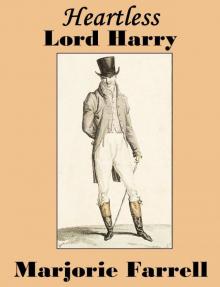 Heartless Lord Harry
Heartless Lord Harry Journey of the Heart
Journey of the Heart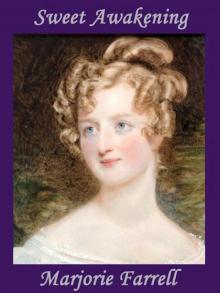 Sweet Awakening
Sweet Awakening Desert Hearts
Desert Hearts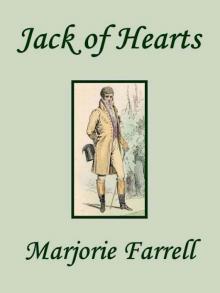 Jack of Hearts
Jack of Hearts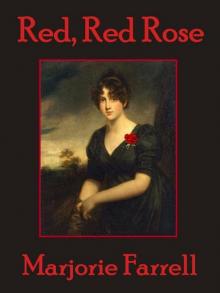 Red, Red Rose
Red, Red Rose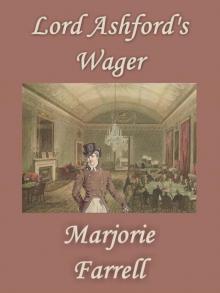 Lord Ashford's Wager
Lord Ashford's Wager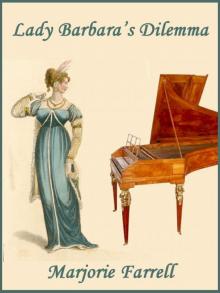 Lady Barbara's Dilemma
Lady Barbara's Dilemma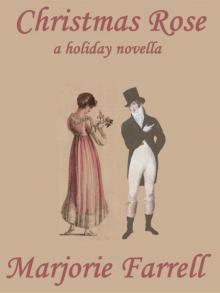 Christmas Rose
Christmas Rose